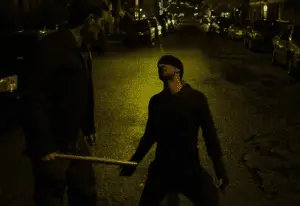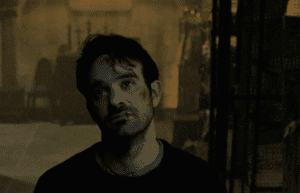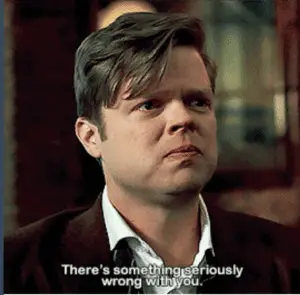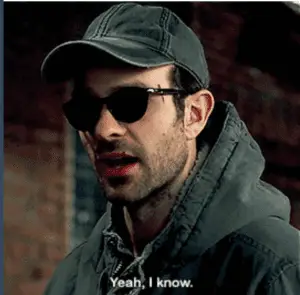Part 1 of a 2-part article. Click here for part 2.
I’m a huge fan of the Marvel Netflix shows, and Daredevil in particular holds a special place in my heart. The fascinating, flawed and complex characters are what draw me back to these shows again and again. So, I forgive a lot of missteps, and I don’t critique these shows lightly. But even I have to admit that, in some of Daredevil Season 2 and its unofficial sequel, the crossover show The Defenders, the showrunners kind of dug themselves into a deep hole… Literally.
The plot of Defenders involved an actual giant pit dug in Manhattan, in Midland Circle. This pit was the brainchild of the Hand, the evil organization of ninjas who deal in dark magic, who had it dug to access an ancient dragon skeleton (yes, in New York City) whose bones, ground up, were an essential ingredient for their powers of immortality. Defenders was a stark departure from much of the first two seasons of Daredevil, which had combined courtroom drama, moral complexity, great character development, and awesome fight scenes.
Still, magical ninjas and dragon bones by themselves may not have sunk The Defenders. The show did have a few great moments, especially in the interactions between characters from the different franchises. But in terms of its overall writing, Defenders was a bit of a mess. (Yes, many jokes about “plot holes” have been made.) After the tight plotting and excellent character development of the prior Daredevil seasons, Defenders’ relative lack of these things felt like a let-down.
Because of the mixed quality of Daredevil Season 2, and the disappointment we had over The Defenders, some of us Daredevil fans approached Season 3 warily. Of course, I’m too big of a fan to let any trepidations stop me from watching – I aimed to binge my way through the next adventures of Matt Murdock & Friends no matter what the quality of the show. As more and more teasers and previews were released, though (there were a lot!), us fans got cautiously optimistic. And now, having finished the season, I am thoroughly pleased. The new showrunner, Erik Oleson, dug Daredevil out of that deep hole in Midland Circle in more ways than one.
Oleson grounded the series back on earth, more or less, with antagonists based in organized crime rather than magical ninjas. But the showrunner did a lot more than that. He tapped back into what made the show great in the first place: the characters, with all their flaws, motivations and internal conflicts. Oleson gave the actors meaty, deep character stuff to chew on, including exploration of backstory and scenes full of complex emotions. This was a relief after Defenders, in which too many talented actors were underused or given lackluster writing to work with.
In this 2-part series, I’ll dive into a few key characters in Season 3 who really made this season superb TV viewing.
Spoilers forthcoming. Content warning for suicidal thoughts/actions.
*
Matt Murdock
Matt Murdock, along with his Daredevil alter-ego, is a beloved superhero precisely because he is a hot mess. His superpowers do not give him super-strength or impenetrable skin; he’s more vulnerable than many superheroes, susceptible to getting seriously hurt in fights. (In most of Season 1, he didn’t even have body armor, and he suffered greatly for it.)
Furthermore, Matt’s daytime career and personal life, in both the comics and the show, oscillate between success and disaster; he never stays on the success side for long. He has a complicated relationship with his Catholic religion, with the law, and with his own personal morality. He clings to a moral code in which he never (deliberately) kills anyone, even while he justifies brutally hurting people to get to the root of larger evils. This moral code is shaky at best, allowing Frank Castle to poke holes in it in Season 2.
We lost touch with a lot of these key qualities of Matt’s in The Defenders, partly from the very real challenge of fitting in four superheroes and advancing the plot in eight episodes. As Bo points out in his Season 3 recap, this season re-focuses on Matt’s moral struggles, to great effect.
Matt is a very flawed person, and this is what I love about him as a character. His flaws are deeply explored in Season 3, and they return to and intensify what we’ve seen in previous seasons – he’s impulsive and reckless with his own life; he’s deeply conflicted about faith and morality; and he screws up his personal relationships constantly, to his own and others’ detriment.
Emotional problems
The opening few episodes of Season 3 show Matt at maybe his lowest point of all three seasons. He has always been reckless with his own life and limb, and in fact seems to willingly die in Elektra’s arms at the end of Defenders. Now we see him in a very dark place, going out to pick fights with criminals when he’s injured, weak, and not in full possession of his fighting skills or sensory powers. After being beaten, he encourages the criminals to kill him.
The whole excursion makes clear the unhealthy mental state Matt is in. It could be that Matt felt compelled to go out Daredeviling, and impulsively chose to die when the evidence stacked up that he was no longer competent as Daredevil. Another interpretation is that he went out in the first place deliberately trying to get himself killed, in a more premeditated suicide attempt.
Whether this is a full-on depression episode for Matt, we’ll never know – this is not a man who is ever going to seek professional help. It’s clear, though, that he’s mentally unstable and in a crisis. Fortunately, he has Sister Maggie there to help him pull through, giving him the kind of straight-shooting guidance he’ll actually listen to.
A crisis of faith
Matt’s faith has been shaken up, too, and this is part and parcel of his emotional crisis. He thinks God has forsaken him. The events of the previous seasons, especially watching Elektra be resurrected and then die again, have caused Matt to lose his faith in the benevolence of God and in justice on earth. “Job was a pussy” is a pretty adolescent way to express this, but then again, Matt has always struggled a bit with emotional maturity.
With the themes of resurrection for both Matt and Elektra, I half expected a parallel to be drawn with the Resurrection with a big “R” – after all, it’s a pretty central concept in Catholicism. Having your dead loved one be revived in a dark magic ritual by an evil cult seems like it could throw a wrench into your idea that only a benevolent God does such things. But that might have been a little controversial to point out in a mainstream show. I guess the writers figured they were safer using the biblical story of Job to demonstrate Matt’s wavering faith.
As a side note, I am holding out hope that Elektra isn’t actually dead. After all, Matt made it through the Midland Circle building collapse somehow, which has not been fully explained. We only got a hint from a short flashback showing a blast throwing Matt several stories up, out of the hole – but it was shot in a dreamlike way that means it could be metaphorical or a hallucination of sorts.
In any case, by comic-book logic it stands to reason that Elektra could also have survived. She’s a “Black Sky” (whatever that means – earlier Daredevil seasons and Defenders gave us conflicting hints), and was resurrected once before – doesn’t the dragon bone elixir render her immortal, just coming back a little more morally corrupted each time? Elektra has a lot of potential as a character, not always well-realized in the writing but rescued in large part through Elodie Yung’s acting. I hope we haven’t seen the last of her, but I won’t hold my breath.
Personal relationships
The final thing I want to say about Matt is how delighted I am in what a jerk he is to his loved ones, at least in the first part of the season. Despite their dramatic fallings-out in previous seasons, Foggy is the closest thing to family Matt has got. So it was shocking, and yet so firmly in character, how Matt treated Foggy in episode 3. He surprises Foggy in a bar, and before Foggy can begin to wrap his head around the fact that his best friend is still alive, he gives Foggy some curt instructions to stay away from Fisk, steals his wallet (!), and leaves.
To add insult to injury, in their brief exchange, Matt tells Foggy that it was a mistake to ever have become his friend. And he instructs Foggy to not tell Karen he’s alive – when we know how much stress it put on Foggy in previous seasons to be forced to keep Matt’s secrets from Karen. Who, incidentally, Matt had promised to never keep secrets from again.
This shoddy treatment of his friends is fully in line with Matt’s character arc. He has put Karen and Foggy through quite a lot in past seasons, and only barely began to make amends in Defenders. Now, in an emotional and moral crisis, his reckless treatment of his friends is only dialed up. If we go with the depression interpretation, it also fits. Plus, Matt has channeled all his rage into a single-minded obsession with Wilson Fisk, and he has always been willing to stomp on his personal life in service of his battles as Daredevil.
So, I welcomed Matt being a dick. It was very him. He’s a troubled and imperfect character, which is exactly what makes him interesting.
*
Karen Page
Fortunately, the misguided decisions Matt initially makes about his friends don’t stick. His intentions were to protect them, after all, and he quickly sees that there is no way he can do that. He does a 180, realizes he needs Karen’s help, and shows up in her apartment in episode 6.
This was a very satisfying scene. Karen, unlike Foggy, is not surprised Matt is still alive. And she’s had it. The man who said he wouldn’t lie to her anymore has been in hiding, not letting her know she was alive, for months. “You owe me rent,” are her first, blunt words to him – she’s been checking on his apartment, collecting his mail and keeping the lights on, all this time. Karen is a take-no-shit kind of person, and she’s not one to easily forgive Matt’s transgressions.
She’s doing him a favor, here, too: someone needs to hold Matt accountable. Sister Maggie’s been valiantly trying, but she has to tread cautiously to not break his tenuous trust in her. Foggy meted out some real consequences to Matt in previous seasons, putting his foot down and breaking up their law partnership. But in this season, Foggy seems back to being loyal to a fault. He even makes a guilt-tripping speech to Karen that she should welcome Matt back into her life and help him, referring to how so many people have abandoned Matt all his life. So Karen is who we’ve got to take Matt to task when necessary.
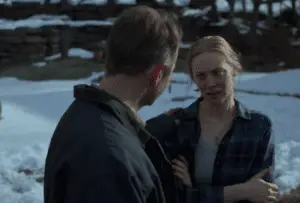
Filling in the gaps
Overall, this season delivered more for Karen’s character than possibly any other character in the show. Showrunner Oleson gave viewers the satisfaction of resolving plotlines we’ve been waiting a long time for. One of these was finally showing Karen’s reactions to Matt’s Daredevil reveal. Another was Karen finally confessing, to Foggy first and later to Matt, her murder of Fisk’s right-hand-man Wesley. Those scenes played very real, and very moving: Deborah Ann Woll knocked it out of the park all season, but for me, the murder confession scenes really stood out.
In addition, we finally got Karen Page’s backstory. This has been hinted at tantalizingly throughout the previous two seasons. We knew she was running from something when she came to New York from rural Vermont, which was not long ago with respect to Season 1. We knew she had some dark secrets, something involving a car crash and her brother. We knew she was good with firearms. In the current season, the hints continue: In a heartbreaking scene, Karen calls her dad, asking to come stay with him a while. He refuses, and she carefully hides her tears.
Amazingly, it turns out that the previous showrunners had not bothered to figure out a backstory for Karen. This is according to Oleson, who asked and learned they didn’t have any details hammered down – so, fortunately for him (and for us!), he got to make up whatever he wanted.
Oleson didn’t disappoint. A big chunk of Episode 10 is an extended flashback into Karen’s life in Vermont, before she came to the city. With clear, believable world-building, the flashback feels like its own stand-alone mini-movie, the kind that could win awards at a film festival. We get so much depth added to Karen’s character, learning about how she was the caretaker of her family while also engaging in reckless activities with her drug dealer boyfriend. I thought it particularly revealing that, even when her brother turns on her, Karen ultimately goes to his side: she shoots her boyfriend in the arm to save her brother. In that context, her brother’s death through her own reckless endangerment packs a wallop of emotional impact.
The writers and director deserve huge kudos for the Karen flashback. It may have been my favorite part of the whole season.
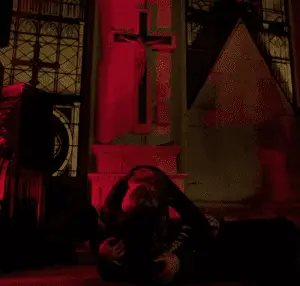
Comics connections
I also think the writers deserve credit for making deliberate references to Karen-related storylines in the comics, while re-inventing them in ways that fit this more modern incarnation of Karen.
In the comics, Karen is famously killed by Bullseye in a church; we get a re-creation of that red-lit church scene but with the roles inverted, Karen cradling a hurt Matt in her arms. Another classic comics storyline has Karen becoming a heroin addict and selling Daredevil’s identity to Fisk for drugs. The show makes nods to that in two ways: there were drugs in Karen’s past, and Karen inadvertently confirms Fisk’s growing suspicion that Matt is Daredevil. These choices pay homage to the comics while making much more sense for this version of Karen’s character.
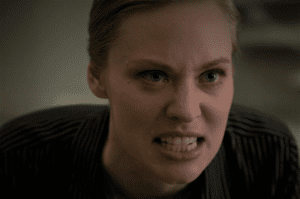
Karen and Fisk head-to-head
If all that wasn’t enough, Karen’s confrontation with Fisk packed so much power. Both Woll and Vincent D’Onofrio turned in some brilliant acting in this scene. In a move that rivals Matt in recklessness, she tells Fisk she murdered Wesley in order to get a rise out of him and try to goad him into attacking her for the FBI cameras. This is the moment you realize, if you haven’t already, that Karen will do truly insane things in her quest for justice. She makes a striking parallel with Matt.
Karen has been a harder character to like for some. But in Season 3, the writing for her and Woll’s excellent acting exceeded all my hopes. The writer’s room this season was reportedly 50% women – sadly rare for writer’s rooms – which no doubt contributed to the great job done with this complex female character. After this season, Karen may have even surpassed Foggy as my favorite supporting character in the series (which is saying a lot!).
*
Stay tuned for Part 2, in which I’ll delve into character highlights of Sister Maggie, Wilson Fisk, and the reunion of Nelson, Murdock and Page!


